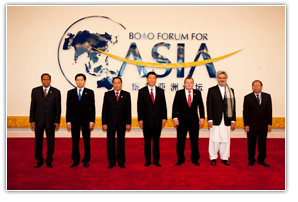S.Batbold gave a speech at the Annual Boao Forum for Asia
 Speech by S.Batbold, Prime Minister of Mongolia
Speech by S.Batbold, Prime Minister of Mongolia
at the 2010 Annual Boao Forum for Asia “Green Recovery: Asia’s Realistic Choice for Sustainable Growth”
10 April 2010, Hainan province, Peoples’ Republic of China
Excellency Mr. Xi Jinpin,
Vice President of the Peoples’ Republic of China
Excellencies,
Ladies and Gentlemen,
It gives me a great honour and privilege to be a keynote speaker at this annual conference of the Boao Forum for Asia.
At the outset, I would like to express my sincere gratitude to the Board of Directors of the BFA for inviting me to this forum and to the Government of China - our friendly and good neighbor - for its warm welcome and hospitality.
Since its inception, Boao Forum serves as an important venue for promoting close interaction and cooperation among countries and business communities in Asia and finding common solutions to key challenges facing this region.
The impact of the recent global financial and economic crises is still deep. Thanks to decisive and concerted action by governments, most notably China, markets show positive signs of recovery. But it is slow and fragile.
At the same time many countries face a host of challenges including the restructuring of their economies. I believe that economic restructuring is largely a lesson to be drawn from the global economic crisis. And it also poses a challenge to many in light of reaching a global agreement to fight climate change.
In this context, the theme of this year’s conference is timely and vital to bring our voices and ideas together on building a strong, healthy and resilient Asia with the aim of ensuring a long-term economic growth and sustainable development.
Many Government and business leaders all over the world recognise the need to take actions to build a green economy notably through restructuring. This will also be part of concerted efforts of the international community in response to possible crises in the future. From Asia, South Korea and China top in the world in terms of committing substantial part of their fiscal stimulus packages to green investment.
However, a real challenge facing countries with substantial natural resources is how to move from a resource-extensive economy into resource-efficient one. Therefore, it is becoming essential for them to pursue policies in order to achieve sustainable growth within the shortest possible period because mounting development challenges, in particular addressing poverty, unemployment, health and education, housing and air pollution require a lot of resources.
At the same time, it is very encouraging to note that there are more innovations, technologies and best practices available not only in the developed countries but also in developing ones.
Excellencies,
Ladies and Gentlemen,
For Mongolia, the development goal is multiple as I mentioned above. Therefore, I define my Government’s policy as ‘the combination of development for the people and people for the development’. This certainly attributes sustainable growth.
It is in this context that the Government of Mongolia is seriously considering various options to move from a “brown economy” to a “green one” through green investment and environmentally sound technologies for development of mining, railway and building sectors. However, moving from coal and oil for meeting energy needs in the country will take some years, if not decades. This is a dilemma for our development.
I believe that the impact of climate change is significant on the sustainable development. Therefore, actions at regional level are needed first to address the impact of climate change if global sustainable development is to be achieved.
In this regard, I welcome China’s efforts to respond to climate change. China was the first developing country to adopt and implement a National Climate Change Program. China has made considerable efforts in energy conservation and pollution reduction in recent years and set its target for cutting greenhouse emissions. These actions will have a profound impact on sustainable development not only in China, but also in the region and beyond.
Mongolia is highly vulnerable in ecological terms. Therefore, it becomes challenge for us to effectively exploit natural resources in a sustainable manner.
Other concerns we face today are inappropriate grazing patterns and agricultural practices, which place extreme pressure on the land. Prolonged drought throughout the country, especially in the Gobi desert over the past few years has caused water shortages in many places, forced nomads to migrate to other areas, where the concentration of livestock gives an additional burden to the pastureland. Almost 90 per cent of the territory has become vulnerable to desertification and land degradation. Today desertification affects areas as close to as the capital city Ulaanbaatar at an alarming speed.
Mongolia’s economy is mainly based on agriculture and mining. Development of Oyutolgoi gold and copper deposit is underway and a dozen of other strategically important minerals’ deposits are to be developed soon. Presently, mining sector accounts for 30 percent of GDP and 80 percent of total export. And it is inevitable that we will maintain the natural resource-based economic development for some time. At the same time, we will ensure that this development pattern have a minimum possible impact on the environment and nature.
I would like to conclude this speech by a famous saying: “We have not inherited this earth from our forefathers but borrowed it from our future generation”. Therefore, we should leave a better living place and safe environment to our next generation.
Thank you for your attention.
